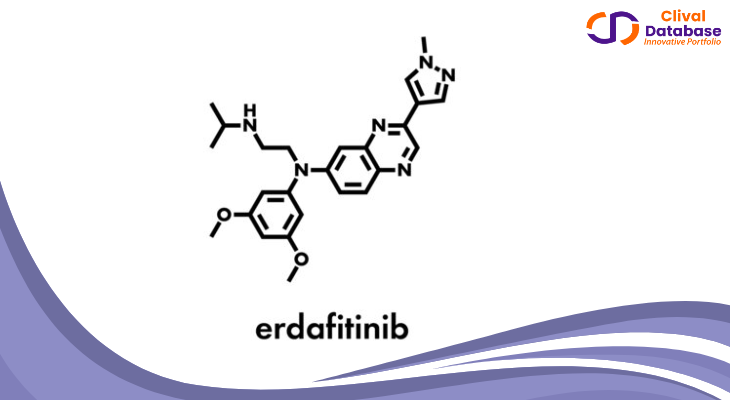Erdafitinib : Targeted Therapy for Urothelial Carcinoma Explain
Introduction
Erdafitinib is a novel compound that has recently become an object of interest in oncology due to its selective interaction with genetic abnormalities. Balversa®, is the brand name of novel molecule, erdafitinib, that directly targets FGFRs. It’s an oral formulation mainly indicated for treatment of urothelial carcinoma of the urothelial tract. Used for the treatment of selected type of bladder cancer, Erdafitinib cleared by the United States Food and Drug Agency (FDA) is another example of how precision medicine is gradually gaining grounds in cancer therapies.


Properties of Erdafitinib
Erdafitinib is a tyrosine kinase inhibitor with some selectivity towards the FGFR1, FGFR2, FGFR3, and FGFR4 that are also collectively known as the fibroblast growth factor receptors. Interestingly, Erdafitinib blocks these receptors that inactivate many signaling pathways that are crucial for growth and development of the tumor. Its chemical name is C22H24N4O3S and it has characteristics that enables it to reach tissues in the body and be effective.
Mechanism of Action1
Erdafitinib mechanistically inhibits the enzymatic activity of FGFR1, FGFR2, FGFR3, and FGFR4. These receptors are involved with the process of cell proliferation, survival, as differentiation. Another is the ability of erdafitinib to suppress the signaling of FGFR which initially fosters development of tumour and ultimately decrease chance for the cancer cells to survive. In many cancers including bladder cancer, the FGFR mutations or fusion subsequently cause constitutive activation of such pathways leading to induced growth of cells.
Mechanism Highlights:
- Inhibition of FGFR Signaling: Erdafitinib forms a complex and inhibits FGFRs resulting in the inhibition of their activity and downstreaming signaling pathways.
- Induction of Apoptosis: It inhibits growth signals so that it can trigger cancer cells to die through a programmed process known as apoptosis.
- Suppression of Angiogenesis: It may also inhibit new blood vessel formation which tumors need for growth, since it interferes with FGFR signaling.
Anti-Cancer Properties
Some anticancer activities have been determined to be associated with Erdafitinib, which has proven to work best on urothelial carcinoma, the most common bladder cancer. The drug, because of its potential for epigenetic modifications, has a role in precision oncology and a primary goal in offering patients with few therapies. In further, it has demonstrated antitumor activity in different solid tumors having alterations in FGFR genetics. 1
Clinical experimentation of erdafitinib has been centered towards its targeted treatment strategy in cancer related to FGFR gene mutation. The Medicines minimized possibility of FGFR phosphorylation and signaling has been the area of most interest. 1
Clinical Indications:
- Urothelial Carcinoma: Indicated for adult patients with locally advanced or metastatic bladder cancer harboring susceptible FGFR3 or FGFR2 alterations.
- Combination Therapies: Researchers also wish to know how effective Erdafitinib is in combination with other treatments.
Clinical Trials of Erdafitinib
Erdafitinib has done phase I, II, and III trials to determine the efficacy of this drug. Notable trials include:
- Phase I Study: A multicenter US Phase I trial evaluated the effects of erdafitinib among patients with advanced or refractory solid malignancies. ²
- THOR Cohort 1: In this trial, erdafitinib was compared to chemotherapy in the subject population with advanced or metastatic urothelial carcinoma.3
- TAR-210 Study: A Phase I, open-label, multi-cohort study assessed the tolerability of erdafitinib in patients with high-risk and intermediate-risk non-muscle-invasive bladder cancer (NMIBC).4

Completed Clinical Trials:
Erdafitinib has been investigated in various settings, including:
- Monotherapy of bladder cancer.
- The use of both immunotherapies and chemotherapy.
- The participants in erdafitinib trials generally have advanced or metastatic cancer with FGFR genetic changes. Most of these patients have previously received an initial-line treatment with platinum based chemotherapy and are now in need of other treatment alternatives.3
Clinical Organizations Involved
Many clinical organizations and research pharma companies have played vital roles in advancing Erdafitinib’s clinical trials, including:
- Johnson & Johnson (Janssen Pharmaceutical)- Company conducted thorough research to get this targeted therapy to market.
- Memorial Sloan Kettering Cancer Center: Carried out key researches on the FGFR inhibitors.
- Johns Hopkins University: Involved in molecular-stage therapies for bladder carcinoma.
- National Cancer Institute (NCI): Participated in several investigations to determine efficacy of the drug.
Insights on Erdafitinib
Globally, bladder cancer is the seventh ranked cancer in overall incidence. The reported incidence per year and per 100 000 populations is 9.5 in men and 2.4 in women. 5 Some of the clinical trials based databases provides accurate information about this anti-cancer drugs. A leading clinical portal, Clival database offers the detailed information about Erdafitinib including the clinical trials, therapy information, and worldwide information. It provides the information about trial phases, patient’s results and the data concerning the research of Erdafitinib as well as the possibilities to predict the further advancement of the drug for practical usage. This centralized database supports the progression of clinical knowledge as well as benefiting patients, by providing comprehensive clinical trial data.
Current Scenario: Erdafitinib in the World and India
Global Perspective
Currently, erdafitinib is available in several countries, including the USA and EU.6 Ever increasing, erdafitinib serves as a standard of care for metastatic FGFR-altered bladder cancer. It has been established that the drug could still be applicable in other malignant diseases including breast and lung cancer. The general shift in demand for targeted medicine for cancers based on the genetic markers is seen as a key factor influencing the keenness for drug such as Erdafitinib.
Scenario in India
In India there is rising trend for acceptance of Erdafitinib, more oncologist has realized the role of FGFR alteration testing in bladder cancer patients. Many challenges remain, that are:
- Access to Genetic Testing: Relative scarcity of integrated service providers offering various forms of genetic tests.
- Cost of Treatment: Unfortunately, erdafitinib is pricey and many patients do not get it through insurance.
Erdafitinib is a progressive development in the treatment of urothelial cancer and other cancers carrying FGFR aberrations. The fact that it is highly specific and seems to have relatively favorable clinical outcomes make it an adjunct member of the oncology team.
Future Directions
Although todays Erdafitinib use is limited to specific cancers, further clinical research is underway for new indications and application. Incorporation of Erdafitinib to conventional cancer treatment regimens in India and across the globe will require improved education regarding the genetic testing and personalized therapy.
Conclusion
Erdafitinib is a new and breakthrough treatment of bladder cancer treatment that may be essential to patients with mutated genes. Specificity of the manner of action, proved effectiveness of the drug in clinical trials, and further research highlight its roles in a developing picture of cancer treatment. However, with the increasing popularity of the approach in precision medicine, Erdafitinib remains one of the examples of how targeted cancer therapies increase patient survival rate.
References: -
- https://www.balversa.com/
- Bahleda, R., Italiano, A., Hierro, C., Mita, A., & Cervantes, A. (2019). Multicenter Phase I Study of Erdafitinib (JNJ-42756493), Oral Pan-Fibroblast Growth Factor Receptor Inhibitor, in Patients with Advanced or Refractory Solid Tumors. Clinical Cancer Research, 25(16), 4888–4897.
- Loriot, Y., Matsubara, N., Park, S. H., & Huddart, R. A. (2023). Erdafitinib or Chemotherapy in Advanced or Metastatic Urothelial Carcinoma. New England Journal of Medicine, 389, 1961–1971.
- Johnson & Johnson- https://www.jnj.com/media-center/press-releases/tar-210-results-show-90-recurrence-free-survival-and-90-complete-response-in-patients-with-high-risk-and-intermediate-risk-non-muscle-invasive-bladder-cancer-respectively.
- ncbi.nlm.nih.gov/books/NBK536923
- EMA, 2024.
Frequently Asked Questions

Optimize Your trial insights with Clival Database.
Are you exhausted from the uncertainty of trial insights pricing? Clival Database ensures the clarity in the midst of the global scenario for clinical trials to you.Clival Database is one of the best databases that offers an outstanding number of clinical trial data in terms of 50,000+ molecules and from primary regulatory markets as well as new entrants like Indian and Chinese markets.
Elevate your trial success rate with the cutting-edge insights from Clival database.
Check it out today and make more informed sourcing decisions! Learn More!







